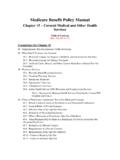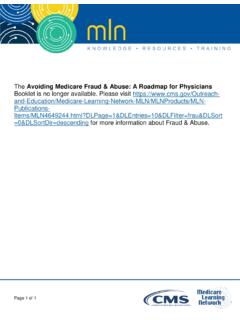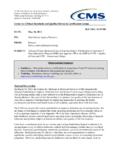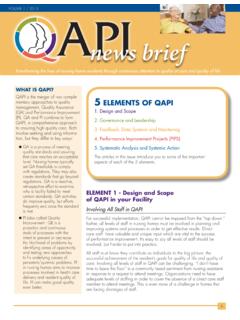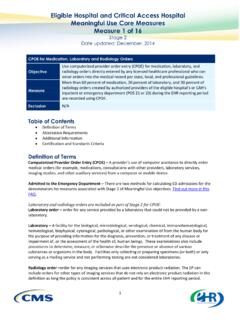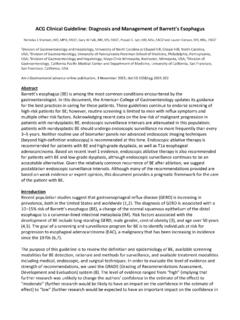Transcription of Proton Pump Inhibitors: Use in Adults
1 Proton Pump Inhibitors: Use in AdultsOctober 2015 The Centers for Medicare & Medicaid Services (CMS) Medicaid Integrity Group (MIG) has identified issues with using medications in the Proton pump inhibitor (PPI) drug therapy class. The Food and Drug Administration (FDA) approves product labeling for prescription drugs. The MIG has identified that some providers may have prescribed PPIs outside of FDA-approved product labeling for indication, age, dosage, or duration of therapy. Therefore, CMS wants to improve quality of care and enhance patient safety by educating providers on the proper use of PPIs in adult fact sheet summarizes for providers the current FDA-approved product labeling for the use of PPI medications in adult patients. After reading this fact sheet, providers should be able to accurately: Recall the FDA-approved indications for PPI use in Adults and the specific indications for each PPI; Recall the FDA-approved dosing options for PPI use in Adults ; and Describe the adverse reactions of, and risks related to, long-term use of of Proton Pump InhibitorsPPIs block the acid-producing enzyme system in the stomach wall and prevent acid production in the stomach.
2 Lack of acid in the stomach prevents ulcer formation; promotes healing of existing ulcers in the esophagus, stomach, and duodenum; and provides symptom relief. PPIs differ in how they are metabolized by the body, how they interact with other medications, and the length of time they are active in the body. However, there is no evidence that one PPI is more effective than another at treating any of the approved Pump Inhibitors: Use in Adults2 FDA-Approved Indications for Proton Pump Inhibitors in AdultsPPIs are used to prevent and treat gastric acid-related conditions. The FDA-approved indications for use include: Healing of erosive esophagitis (EE); Maintenance of healed EE; Treatment of gastroesophageal reflux disease (GERD); Risk reduction for gastric ulcer (GU) associated with nonsteroidal anti-inflammatory drugs (NSAIDs); Helicobacter pylori (H. pylori) eradication to reduce the risk of duodenal ulcer (DU) recurrence, in combination with antibiotics; Pathological hypersecretory conditions, including Zollinger-Ellison (ZE) syndrome; and Short-term treatment and maintenance of dose and length of therapy depend on the medication and the indication.
3 Not all PPIs are approved for every indication. For more information, review the document Proton Pump Inhibitors: Food and Drug Administration-Approved Indications and Dosages for Use in Adults available at on the CMS , lansoprazole, and omeprazole are PPIs that are available without a prescription. Over-the-counter (OTC) PPIs are FDA approved for treating frequent heartburn in patients 18 years old and older. Frequent heartburn is defined as when a patient experiences symptoms at least two times per Guidelines for Gastroesophageal Reflux DiseaseThe Agency for Healthcare Research and Quality (AHRQ) hosts a database of treatment guidelines. The AHRQ is a branch of the Department of Health and Human Services. For information on the available treatment guidelines, search Proton pump inhibitors or any of the gastric acid-related conditions for which a PPI is an indicated treatment in the AHRQ s National Guideline Clearinghouse at on the Internet. Links to some of the treatment guidelines for use of PPIs in Adults are provided in Table 1.
4 Treatment Guidelines for the Use of Proton Pump Inhibitors in AdultsSponsoring OrganizationTitle of GuidelineLink to GuidelineAmerican College of GastroenterologyGuidelines for the diagnosis and management of gastroesophageal reflux disease. [2013] College of GastroenterologyManagement of patients with ulcer bleeding. [2012] Pump Inhibitors: Use in Adults3 ACRONYMSAHRQ Agency for Healthcare Research and QualityCDAD Clostridium difficile-associated diarrheaCDER Center for Drug Evaluation and ResearchCgA ChromograninCMS Centers for Medicare & Medicaid ServicesDU duodenal ulcerEE erosive esophagitisFDA Food and Drug AdministrationGERD gastroesophageal reflux diseaseGU gastric ulcerMIG Medicaid Integrity GroupMPIE Medicaid Program Integrity EducationNSAID nonsteroidal anti-inflammatory drugsOTC over the counterPPI Proton pump inhibitorZE Zollinger-EllisonAdverse Reactions and Risks of Using Proton Pump Inhibitors in AdultsPPIs are generally well tolerated. The most common adverse reactions seen in Adults are flatulence, headache, diarrhea, nausea, abdominal pain, and vomiting.
5 [1, 2, 3, 4, 5, 6, 7] The use of PPIs has also been associated with drug interactions, fractures, hypomagnesemia, and Clostridium difficile-associated diarrhea (CDAD). Omeprazole has been associated with false positive results in diagnostic investigations for neuroendocrine of Drug Interactions with Proton Pump InhibitorsClinically significant drug interactions with PPIs are rare. Chronic acid suppression can minimize the effectiveness of any medication requiring an acidic environment for absorption. Commonly prescribed medications affected by acid suppression are ampicillin esters, digoxin, atazanavir, ketoconazole, and iron salts.[8]There is also risk of drug interactions between PPIs and other medications that are metabolized via the cytochrome P450 system. While specific interactions are not well documented, there is substantial evidence regarding an interaction between clopidogrel and omeprazole.[9] Other drug interactions that may be clinically significant are dependent on the specific cytochrome P450 enzyme substrates and the specific PPI.
6 The prescribing information for each PPI provides more detailed information on drug interactions. Search the medication name at on the FDA website to retrieve prescribing information and detailed drug interactions for each PPI Use of Omeprazole with ClopidogrelOmeprazole reduces the efficacy and ability of clopidogrel s anti-platelet effect, which may increase the risk of a heart attack. Patients at risk for heart attacks or strokes who are given clopidogrel to prevent blood clots may not get the full protective anti-clotting effect if they also take omeprazole. In a crossover clinical study, the mean inhibition of platelet aggregation decreased by 39 percent on day 1 and 21 percent on day 5 when omeprazole and clopidogrel were administered together. In another study, results showed that administering the medications 12 hours apart did not prevent this drug interaction.[10] As a result, the FDA recommends avoiding the simultaneous use of omeprazole and clopidogrel.
7 [11] Other medications inhibiting CYP2C19, the drug-metabolizing enzyme, should be avoided in combination with clopidogrel. The FDA notified health professionals of possible interactions between omeprazole and clopidogrel and included the following considerations: Separating the time of clopidogrel and omeprazole administration will not reduce this drug interaction; Esomeprazole may interact with clopidogrel similar to omeprazole; and Histamine blockers and antacids do not appear to interfere with the anti-clotting activity of clopidogrel.[12]In October 2010, the FDA posted a reminder to avoid concomitant use of clopidogrel and omeprazole, emphasizing that the recommendation applied only to omeprazole and not all PPIs.[13] Proton Pump Inhibitors: Use in Adults4 Risk of FracturesThe FDA requires that PPI labeling include safety information about a possible increased risk of fractures of the hip, wrist, and spine. This requirement is based on an FDA review of several epidemiological studies with findings indicating that patients who may bear the highest risk for these fractures received a high dose of a PPI or had a duration of PPI therapy lasting longer than 1 year.
8 The majority of these studies included individuals 50 years or older.[14] The FDA requires that a Medication Guide be dispensed with every new or refilled PPI prescription. The Medication Guide informs patients and providers about the risk of bone fractures that may occur when taking a PPI. Links to the Medication Guides can be found at on the FDA of HypomagnesemiaIn March 2011, the FDA published a Drug Safety Communication to inform consumers and health professionals that long-term use of PPIs can cause hypomagnesemia. In 25 percent of patients, magnesium supplementation was not sufficient to correct PPI-induced hypomagnesemia; rather, PPI therapy had to be discontinued. The deficiency did not appear to be dose-related and reappeared after rechallenge with a PPI. The FDA recommends obtaining a serum magnesium level prior to initiation of therapy if a patient is to be on prolonged treatment.[15]Risk of Clostridium difficile-Associated DiarrheaOn February 8, 2012, the FDA published a Drug Safety Communication to inform patients and providers that PPIs may be associated with an increased risk of CDAD.
9 Symptoms of CDAD include abdominal pain, fever, and watery stools. Patients who take a PPI and develop diarrhea that does not improve should be evaluated for CDAD. Patients with advanced age, certain chronic medical conditions, and patients taking broad spectrum antibiotics are at greatest risk for developing CDAD. The FDA recommends using the lowest dose and shortest duration of PPI therapy possible and recommends advising patients to seek medical attention if they develop symptoms of CDAD.[16] The previously mentioned Medication Guide also informs patients and providers about the risk of CDAD when taking a Interactions with Diagnostic Investigations for Neuroendocrine TumorsUse of omeprazole may cause Chromogranin A (CgA) levels to increase secondary to drug-induced decreases in gastric acidity. The increased CgA level may cause false positive results in diagnostic investigations for neuroendocrine tumors. In March 2014, the FDA published a Drug Safety Communication to inform health care providers to temporarily stop omeprazole treatment at least 14 days prior to assessing CgA levels and consider retesting if the initial CgA levels are high.
10 The FDA recommends using the same commercial laboratory for testing if serial tests are performed because reference ranges between tests may vary.[17]Acute Interstitial NephritisDuring PPI therapy patients may develop a hypersensitivity reaction that leads to acute interstitial nephritis. Interstitial nephritis can cause kidney problems, including acute kidney failure. In about half of the cases, decreased urine output is one of the symptoms, although others may experience increased urine output. Other symptoms may include blood in the urine, fever, mental status changes, nausea, swelling, and weight gain.[18] Discontinue PPI therapy if acute interstitial nephritis is diagnosed.[19] Proton Pump Inhibitors: Use in Adults5 Cyanocobalamin (Vitamin B-12) DeficiencyDaily therapy with any acid-suppressing medications for 3 years or more may lead to malabsorption of cyanocobalamin (vitamin B-12) caused by hypo- or achlorhydria. Symptoms may include anemia, loss of balance, numbness or tingling in the arms and legs, and weakness.
